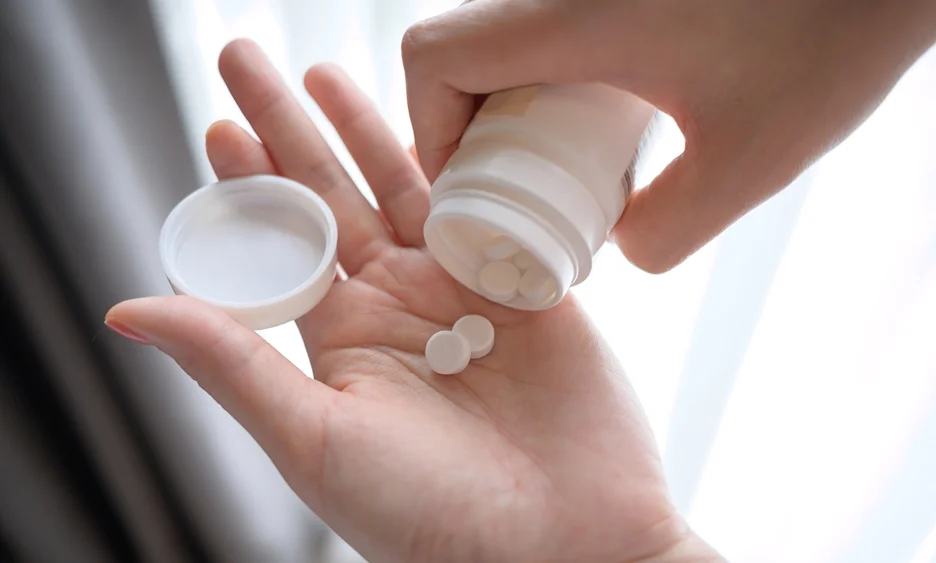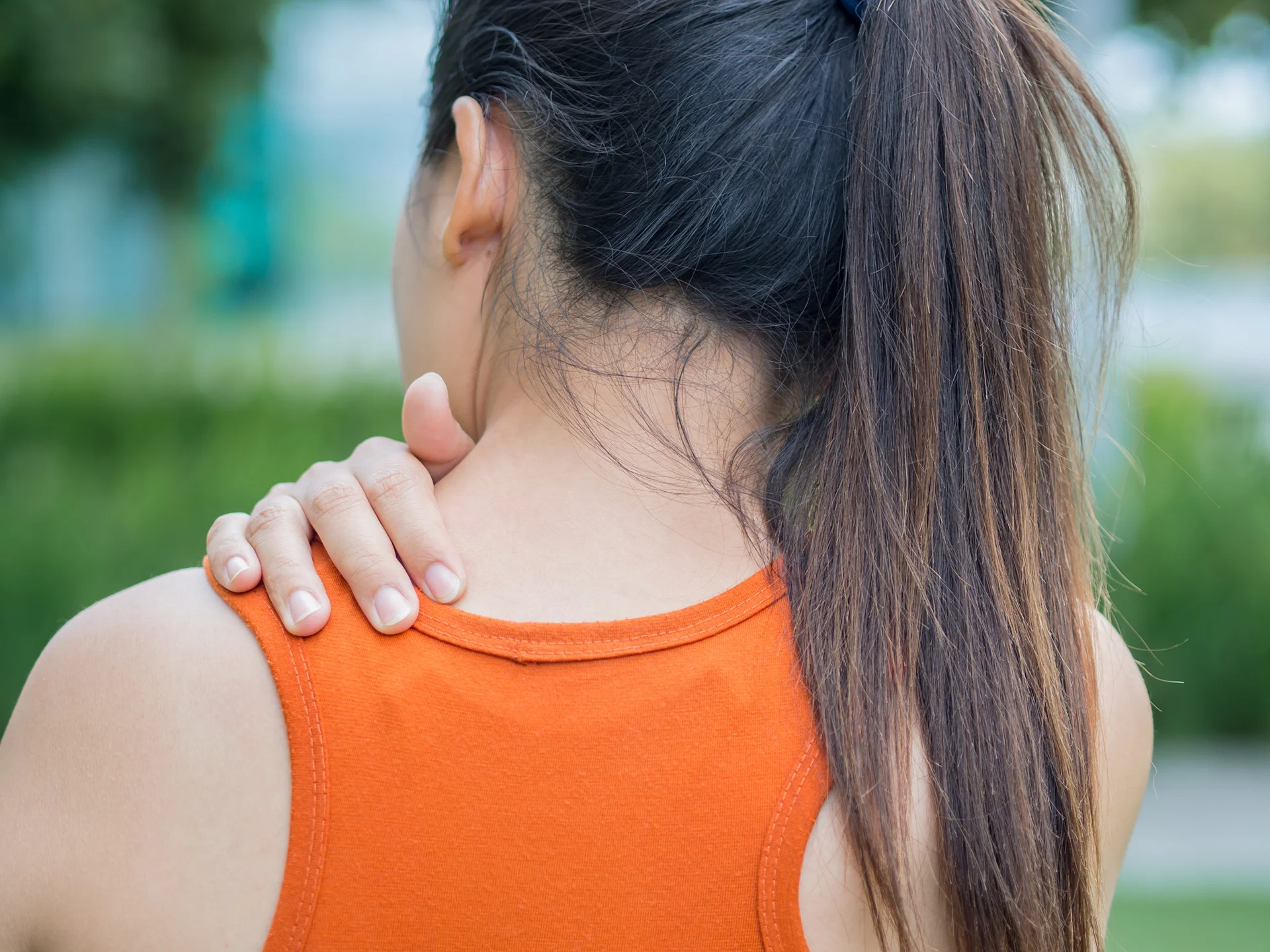Don’t let heartburn burn your back too. Get informed now.
Do you experience burning chest or back pain when you bend over or lie down? Feel like stomach acid is climbing up your throat? Suffer from chronic indigestion and discomfort after meals?
Yes? Well, know that acid reflux could be the culprit. While antacids provide temporary relief, untreated reflux can cause serious complications.
Join us at Kaly as we explore the connections between acid reflux and back pain, natural remedies to soothe your stomach, and the most effective medications to stop symptoms in their tracks.
Could Acid Reflux Cause Upper Back Pain?

Acid reflux or GERD can sometimes cause upper back pain between the shoulder blades through referred nerve signals from the irritated esophagus.
The Link Between GERD and Upper Back Pain
While acid reflux most commonly causes heartburn and chest discomfort, the Kaly specialists explain that chronic GERD can sometimes refer pain signals to the upper back between the shoulder blades. What’s the connection?
According to our clinical experience, the vagus nerve innervates both the esophagus and upper back. When irritated by stomach acid, nerves in the esophagus can send pain signals up the vagus nerve, which a person perceives as upper back pain.
Constant acid irritation from severe GERD sensitizes these esophageal nerves over time. This makes them prone to misfiring and sending errant pain signals to the upper back.
Other gastrointestinal issues like peptic ulcers or pancreatitis are more likely to directly provoke back pain than reflux alone. These refer to pain signals from the inflamed abdomen that manifest as back pain.
Back Pain Impacting Acid Reflux
However, our specialists emphasize that back pain more often contributes to acid reflux rather than resulting from it.
Poor posture, chronic back problems, stress, and certain pain medications can all increase acid reflux risk by:
- Increasing abdominal pressure against the stomach
- Slowing digestion
- Reducing LES pressure
- Exacerbating hiatal hernias
Don’t settle for chronic reflux issues. Our experts listen and provide real relief. Start your search at Kaly!
Can GERD Cause Pain in the Upper Back?
GERD can occasionally cause upper back pain through referred nerve signals, but more often GERD and back pain coincide due to shared risk factors like obesity and poor posture.
What ties GERD and back pain together?
| Risk Factor | Impact on GERD | Impact on Back Pain |
| Obesity | Excess weight puts pressure on the stomach and abdomen, aggravating reflux | Increased spinal loading strains back |
| Poor posture | Slouching or hunching compresses the stomach, worsening reflux | Poor posture directly strains the back and neck |
| Medications | NSAIDs relax the esophageal sphincter, allowing acid reflux | Opioids slow digestion and increase reflux |
| Stress | Stress triggers excess stomach acid production | Back pain is inherently stressful |
GERD Causing Referred Back Pain
In some chronic GERD cases, constant acid irritation of the esophagus can misfire and send pain signals to the upper back. But this is less common than shared risk factors.
Heartburn pain from GERD may radiate from the chest to the upper back in the nerve distribution. But this referred pain is not a direct cause of upper back issues.
Does GERD Cause Chest and Back Pain at the Same Time?
While GERD can cause chest pain radiating to the back, simultaneous chest and back pain is less common than isolated chest discomfort from reflux according to specialists.
GERD-related chest discomfort often manifests as heartburn, a squeezing sensation, or tightness under the breastbone. It may radiate to the back, neck, or arms in the nerve distribution. However, isolated chest pain is more typical than concurrent back pain.
If GERD leads to esophageal ulcers, constant severe pain could result. But these complications are relatively uncommon compared to intermittent reflux chest pain that feels closer to the surface and burning in quality.
According to our clinical experience, other gastrointestinal conditions like peptic ulcers or pancreatitis are more likely sources of referred pain radiating to the back simultaneously.
Does Heartburn Cause Pain in the Back?

While heartburn can radiate burning chest pain to the upper back, it does not directly cause primary back pain in most cases.
Kaly doctors explain that heartburn, a common reflux symptom, can sometimes radiate a burning chest pain to the upper back. However, heartburn does not directly cause primary back pain in most cases.
- What ties these symptoms together? Shared risk factors like obesity, poor posture, stress, NSAID use, and dietary triggers can contribute to both acid reflux and back pain concurrently.
- In some cases, the burning chest pain of heartburn may radiate to the upper back in the same nerve distribution. Even so, isolated heartburn is more common.
- Other digestive issues like ulcers more often directly provoke referred back pain rather than reflux alone.
Distinguishing Heartburn from Concerning Symptoms
It’s important to differentiate reflux-related chest and back pain from more serious conditions like heart attacks that can have similar symptoms. Seek prompt medical care if you experience:
- Sudden, crushing chest pain
- Pain radiating down the left arm
- Shortness of breath, dizziness, nausea
Will Indigestion Cause Back Pain?
While indigestion itself does not directly provoke back pain, it can worsen acid reflux and cause esophageal irritation that radiates pain signals to the upper back in some cases. Indigestion symptoms may also reflect digestive conditions like peptic ulcers or pancreatitis.
According to our experience, severe GERD heartburn can radiate to the back by irritating the esophagus and causing inflammation or esophagitis. Peptic ulcers can also cause concurrent back pain and indigestion symptoms like abdominal discomfort and bloating.
Additionally, pancreatitis typically causes intense upper abdominal pain that radiates to the back and chest. Other potential causes of back pain after eating include poor posture, muscle strain, and problems with organs like the gallbladder.
It’s important to watch for warning signs like unexplained weight loss, vomiting blood, or black/bloody stool. These require prompt medical attention.
Can a Hiatal Hernia From GERD Cause Back Pain?
While hiatal hernias themselves do not commonly cause direct back pain, specialists explain that in some cases, pain from a large hiatal hernia could radiate to the back region.
According to our clinical experience, a few potential mechanisms exist by which a hiatal hernia might contribute to back pain:
- Pressure in the upper abdomen/lower chest radiating to the back in a referred pain pattern
- Irritation of nerves supplying both the diaphragm area and back
- Exacerbation of an underlying back issue like spinal arthritis
However, our specialists emphasize back pain specifically from a hiatal hernia compressing back structures directly is relatively uncommon. Referred pain is more likely, and tends to occur with larger hiatal hernias rather than small ones.
Are There Links Between Back Pain and Esophagitis?
Yes, there are potential links between back pain and esophagitis, like acid reflux pain radiating to the back, muscle tension from esophagitis worsening back pain, and medications for back pain aggravating reflux.
Severe GERD can provoke pain signals that radiate from the irritated esophagus to the upper back region.
- The discomfort of esophagitis can lead to muscle tension and spasms that exacerbate underlying back pain.
- Stress and anxiety caused by chronic back issues may increase esophagitis risk in predisposed individuals.
- Some medications used for back pain, like NSAIDs, can promote acid reflux and worsen esophagitis.
While a few case reports describe patients with concurrent esophagitis and recurrent back pain, the mechanisms behind this association require more research according to our specialists.
One study found a significant portion of patients with esophageal symptoms also had imaging findings of lumbosacral pathology, suggesting a correlation. However, more evidence is still needed to establish causation in either direction.
Natural Remedies for Acid Reflux
The Kaly medical practitioners recommend several lifestyle modifications to help prevent acid reflux episodes:
- Losing excess weight to reduce abdominal pressure
- Avoiding dietary triggers like coffee, alcohol, and fatty or spicy foods
- Not eating within 2-3 hours of bedtime
- Elevating the head of the bed by 6-8 inches
- Quitting smoking and avoiding secondhand smoke
Certain foods can help relieve reflux symptoms due to their alkaline pH or anti-inflammatory effects. Examples include bananas, aloe vera juice, almond milk, papaya, ginger, and baking soda water. Apple cider vinegar may reduce stomach acid.
Some herbal remedies like chamomile, marshmallow root, and licorice may soothe the digestive tract. However, clinical evidence for their efficacy in GERD is limited compared to conventional medications. Peppermint may actually worsen reflux symptoms in some people.
Best Medications for GERD, Acid Reflux, Heartburn, and Indigestion

Prescription proton pump inhibitors like omeprazole are most effective for frequent, severe symptoms, while over-the-counter antacids offer quick relief, and H2 blockers like famotidine work better long-term according to our specialists.
Prescription Medications
- Proton Pump Inhibitors (PPIs)
PPIs like omeprazole and pantoprazole are commonly prescribed for acid reflux and GERD. They reduce stomach acid production and promote healing of damaged esophageal tissue. PPIs are very effective for chronic, frequent symptoms.
- H2 Receptor Antagonists
Also called H2 blockers, these drugs like famotidine work by blocking histamine receptors to reduce acid production. They provide longer relief than antacids but are less potent than PPIs.
Over-the-Counter Medications
- Antacids
Antacids such as calcium carbonate neutralize stomach acid quickly but only provide short-term relief. They may not be as helpful for severe, chronic GERD symptoms.
- H2 Receptor Antagonists
OTC H2 blockers like famotidine take longer to work but relieve symptoms longer than antacids. They reduce acid production.
- Proton Pump Inhibitors
OTC PPIs like omeprazole treat reflux more potently by suppressing acid production. It may take 1-4 days to experience full effects, so they should not be used for immediate symptom relief.
Tired of “one size fits all” reflux solutions? Our experts create tailored treatment plans.
FAQs
How common is back pain with GERD sufferers?
Back pain is not a direct symptom of GERD. However, GERD and back pain can occur together if there is an underlying condition causing both.
Can upper back pain be due to acidity?
Upper back pain is rarely caused directly by acid reflux. More commonly, back pain and acid reflux occur together due to underlying conditions like hiatal hernia or musculoskeletal issues.
Why does the back of my throat feel acidic?
Acid backing up from the stomach into the throat, known as laryngopharyngeal reflux (LPR), can cause an acidic feeling in the back of the throat.
Can acid reflux cause back pain between shoulder blades?
Severe acid reflux can rarely cause referred pain between the shoulder blades. This back pain is more commonly caused by acid irritation of nerves or musculoskeletal issues.
Can lifestyle changes that alleviate acid reflux also relieve associated back pain?
Yes, lifestyle changes like losing weight, eating smaller meals, and raising the head in bed can reduce acid reflux and associated back pain in some cases.
